初中英语各年级语法复习要点(鲁教版)
初中英语鲁教版(五四制)九年级全册Unit 2知识点
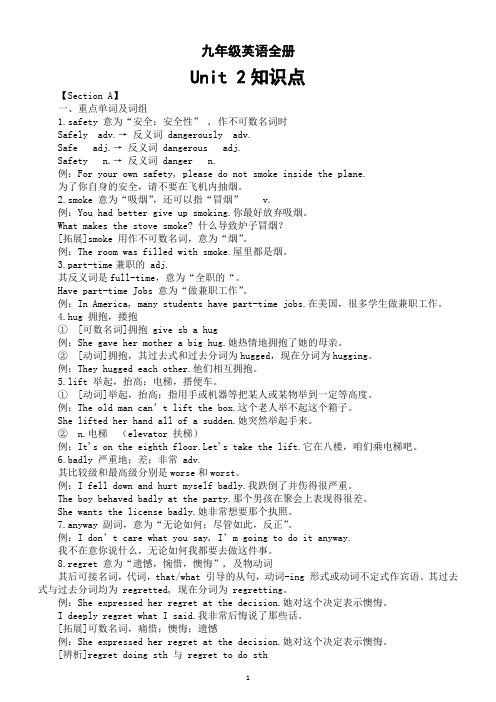
九年级英语全册Unit 2知识点【Section A】一、重点单词及词组1.safety 意为“安全;安全性” , 作不可数名词时Safely adv.→反义词 dangerously adv.Safe adj.→反义词 dangerous adj.Safety n.→反义词 danger n.例:For your own safety, please do not smoke inside the plane.为了你自身的安全,请不要在飞机内抽烟。
2.smoke 意为“吸烟”,还可以指“冒烟” v.例:You had better give up smoking.你最好放弃吸烟。
What makes the stove smoke? 什么导致炉子冒烟?[拓展]smoke 用作不可数名词,意为“烟”。
例:The room was filled with smoke.屋里都是烟。
3.part-time兼职的 adj.其反义词是full-time,意为“全职的“。
Have part-time Jobs 意为“做兼职工作”。
例:In America, many students have part-time jobs.在美国,很多学生做兼职工作。
4.hug 拥抱,搂抱①[可数名词]拥抱 give sb a hug例:She gave her mother a big hug.她热情地拥抱了她的母亲。
②[动词]拥抱,其过去式和过去分词为hugged,现在分词为hugging。
例:They hugged each other.他们相互拥抱。
5.lift 举起,抬高;电梯,搭便车。
①[动词]举起,抬高;指用手或机器等把某人或某物举到一定等高度。
例:The old man can’t lift the box.这个老人举不起这个箱子。
She lifted her hand all of a sudden.她突然举起手来。
鲁教版七年级上册英语知识点归纳
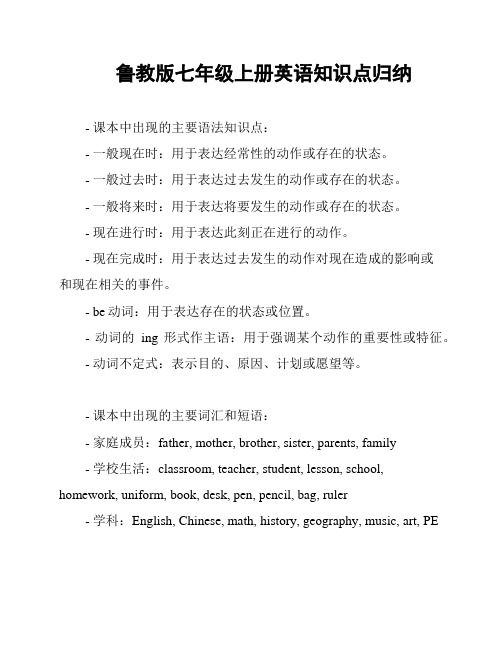
鲁教版七年级上册英语知识点归纳- 课本中出现的主要语法知识点:- 一般现在时:用于表达经常性的动作或存在的状态。
- 一般过去时:用于表达过去发生的动作或存在的状态。
- 一般将来时:用于表达将要发生的动作或存在的状态。
- 现在进行时:用于表达此刻正在进行的动作。
- 现在完成时:用于表达过去发生的动作对现在造成的影响或和现在相关的事件。
- be动词:用于表达存在的状态或位置。
- 动词的ing形式作主语:用于强调某个动作的重要性或特征。
- 动词不定式:表示目的、原因、计划或愿望等。
- 课本中出现的主要词汇和短语:- 家庭成员:father, mother, brother, sister, parents, family- 学校生活:classroom, teacher, student, lesson, school, homework, uniform, book, desk, pen, pencil, bag, ruler- 学科:English, Chinese, math, history, geography, music, art, PE- 时间和日期:week, Monday, Tuesday, Wednesday, Thursday, Friday, Saturday, Sunday, morning, afternoon, evening, today, yesterday, tomorrow, year, month, day- 方位和交通:tree, flower, river, mountain, city, park, street, bridge, car, bike, bus, subway- 食物和饮品:breakfast, lunch, dinner, egg, bread, rice, meat, fish, milk, tea, coffee, water, juice- 环境和天气:weather, sunny, cloudy, rainy, windy, snowy, hot, cold- 课本中出现的主要句型和对话:- 问候和自我介绍:- Good morning/afternoon/evening.- My name is [name].- Nice to meet you.- 询问和告知姓名和年龄:- What's your name?- How old are you?- I am [age].- 询问和告知学校和班级:- What school do you go to?- What grade are you in?- I go to [school name].- I am in [grade].- 描述家庭成员:- Who's this?- This is my [family member].- He/She is my [family member]. - 询问和告知时间和日期:- What day is it today?- What's the date today?- Today is [day], [month] [date].- 询问和告知喜欢的学科和活动:- What subjects do you like?- What activities do you like?- I like [subject/activity].- 描述天气:- What's the weather like today?- It's [weather adjective] today.以上是鲁教版七年级上册英语的主要知识点归纳。
七年级上英语知识点鲁教版

七年级上英语知识点鲁教版作为初中阶段的英语教学重要组成部分,七年级上的英语知识点是学生从英语初学者向初级学习者转化的阶段,掌握这一部分知识对于未来的英语学习和综合能力提高至关重要。
本文将结合鲁教版的教材,详细介绍七年级上英语知识点。
一、基础语法在初学英语的阶段,语法是最基础的部分,以下是七年级上的英语语法点:1. 简单现在时2. 一般过去时3. 被动语态4. 一般将来时5. 现在进行时6. 物主代词7. 物主形容词8. 问句二、单词和短语在英语学习中,单词和短语是非常重要的部分,以下是七年级上的英语单词和短语:1. 数字1-1002. 季节和月份3. 课程和科目4. 颜色和形状5. 常见动物和植物6. 家庭成员7. 时间和日期8. 方位和位置9. 常见娱乐活动三、日常生活用语对于初学英语的学生而言,掌握日常生活用语是非常重要的,以下是七年级上的英语日常用语:1. 问候语和开场白2. 询问和告知位置3. 询问和告知时间4. 询问和告知日期5. 询问和告知天气6. 询问和告知身体状况7. 询问和告知活动安排8. 询问和告知衣着四、听力和口语在初中英语教学中,听力和口语是不可或缺的,以下是七年级上的英语听力和口语内容:1. 基础的听说技巧训练2. 学生自我介绍和他人介绍3. 简短的口头任务4. 问答、听取信息和回答问题5. 听取语音指令并执行任务6. 听取代表基本生活场景的句子并回答问题以上就是七年级上英语知识点的简要介绍。
在英语学习中,系统地学习和掌握这些知识点是非常重要的。
希望本文对初中英语教学和学习有所帮助。
英语九年级鲁教版知识点
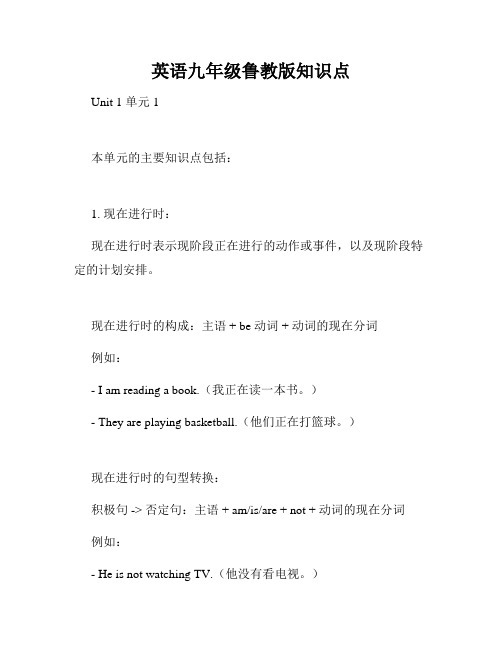
英语九年级鲁教版知识点Unit 1 单元 1本单元的主要知识点包括:1. 现在进行时:现在进行时表示现阶段正在进行的动作或事件,以及现阶段特定的计划安排。
现在进行时的构成:主语 + be 动词 + 动词的现在分词例如:- I am reading a book.(我正在读一本书。
)- They are playing basketball.(他们正在打篮球。
)现在进行时的句型转换:积极句 -> 否定句:主语 + am/is/are + not + 动词的现在分词例如:- He is not watching TV.(他没有看电视。
)- We are not studying for the test.(我们没有为考试学习。
)现在进行时的疑问句:Be 动词提前Be 动词 + 主语 + 动词的现在分词 + 其他?例如:- Are you listening to music?(你正在听音乐吗?)- Is she playing soccer?(她正在踢足球吗?)2. 一般过去时:一般过去时表示过去某个时间发生的动作或状态。
一般过去时的构成:主语 + 动词的过去式例如:- I played soccer yesterday.(昨天我踢足球。
)- He studied math last night.(昨晚他学习数学。
)一般过去时的疑问句:助动词 did 提前Did + 主语 + 动词原形 + 其他?例如:- Did you watch a movie?(你看电影了吗?)- Did they eat dinner?(他们吃晚饭了吗?)3. 特殊疑问句:特殊疑问句用来询问特定信息的问句。
特殊疑问词包括:What(什么)、When(什么时候)、Where(在哪里)、Who (谁)、Which(哪个)、Why(为什么)等。
特殊疑问句的构成:特殊疑问词 + 助动词/系动词/情态动词 + 主语 + 谓语/其他?例如:- What are you doing?(你在做什么?)- Where did you go yesterday?(昨天你去哪里了?)- Why is he late?(他为什么迟到?)4. 英语非谓语动词分类及用法:非谓语动词是指除了谓语动词以外的动词形式。
鲁教版(五四学制)七年级上册英语期末复习各单元知识点提纲(实用,必备!)
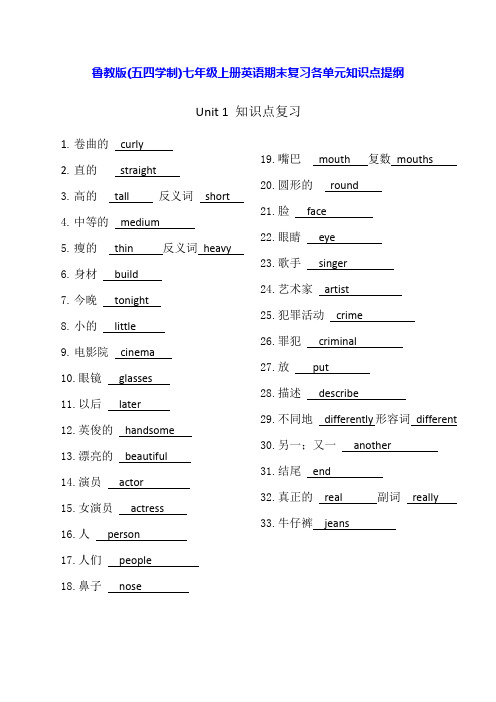
鲁教版(五四学制)七年级上册英语期末复习各单元知识点提纲Unit 1 知识点复习Unit 2 知识点整理短语必备1.散步went for a walk2.挤奶milked a cow3.喂鸡fed chickens4.骑马rode a horse5.拍照took some photos6.很多quite a lot7.太多乐趣so much fun 8.带领某人参观show sb. around 9. 和农民交谈talked with a farmer 10.你真幸运lucky you11.出现come out 12.在乡下in the countryside13.在晚上看星星watch the stars at night 14.去钓鱼went fishing 15.爬山climb a mountain 16.参观消防站visit a fire station 17.沿途along the way 18.令人兴奋的一天an exciting day19..学了很多关于机器人的知识learn a lot about robots20.教我们如何制作机器人模型taught us how to make a model robot21.给某人买某物buy sth for sb.=buy sb. sth22. 太多人too many people 23.总的说来all in all24..一点也不not at all 25.下象棋play chess26.对...感兴趣be interested in 对...不感兴趣be not interested in句子必会1.-你看到奶牛了吗?Did you see any cows?-是的;我看到了很多。
Yes,I did.I saw quite a lot.2.卡罗尔摘了一些草莓并且把它们带回了家。
Carol picked some strawberries and took them home.3.随后,导游教我们如何做机器人模型。
鲁教版八年级上下册九年级全册英语整理

单元课题知识点(语法及重难点)所需课时Unit1.Could you please clean your room? 1、Could you please….?句型2、情态动词“could”用法4.5课时Unit2.Why don’t you talk to your parents? 1、“提问建议”的几种句型2、情态动词should的用法3、连词“until、so that、although”的用法4.5课时Unit3.What were you dong when the rainstorm came? 1、语法“过去进行时”2、“when、while”引导的时间状语从句4.5课时Unit4.An old man tried to move the mountains.连词“unless、as soon as、so…that…”在状语从句中的应用3课时Unit5.what’s the highest mountain in the world? 1、形容词和副词的比较级及最高级表示2、倍数的表示方法4.5课时Unit6.Have you read T reasure Island yet?语法“现在完成时”的陈述句、疑问句及否定句重难点:现在完成时4.5课时Unit7.Have you ever been to a museum? 1、现在完成时的标志词2、Have been to、have gone to、have been in 的区别3课时Unit8.I’ve had this bike for three years.现在完成时中“延续性动词”的用法6课时备注:“所需课时”需要根据以下几个因素来确定:1、学员对本学科基础知识掌握程度;2、学员上课听课效率;3、学员是否进行相关练习(练习多或少);4、以复习还是预习为主(寒暑假期间主要以预习为主,常年班结合学校上课进度,以复习为主,辅助以必要的预习)备注:“所需课时”需要根据以下几个因素来确定:1、学员对本学科基础知识掌握程度;2、学员上课听课效率;3、学员是否进行相关练习(练习多或少);4、以复习还是预习为主(寒暑假期间主要以预习为主,常年班结合学校上课进度,以复习为主,辅助以必要的预习)单元课题知识点(语法及重难点)所需课时Unit1.When was he born? 1、一般过去时复习2、“wonder ”的用法3课时Unit2. It ’s a nice day, isn ’t it? 语法“反义疑问句”(注意反义疑问句里的九种特殊形式)6课时Unit3.Where would you like to visit? 1、would like to do 的用法2、语法:初步接触“定语从句”5课时Unit4.How can we become good learners? 1、“loudly 和aloud ”的区别2、”how ”引导的方式状语的用法4.5课时Unit5.I think that mooncakes are delicious! 1、语法:宾语从句(宾语从句的三个做题步骤)2、感叹句(what 和How 引导的感叹句判断方法)重难点:宾语从句6课时Unit6.Could you please tell me where the restrooms are? 宾语从句表示委婉语气3课时Unit7.I used to be afraid of the dark. ”used to ”的用法(怎样变否定句、一般疑问句以及反义疑问句)4.5课时Unit8.What are the shirts made of?1、语法:被动语态(构成形式、主动句变被动句方法)2、Be made of 、be made from 及be made in 区别6课时九年级全一册(其中两个单元与八年级下册完全重复)单元课题知识点(语法及重难点)所需课时Unit1.When was it invented? 1、被动语态复习(注意在疑问句中的应用)2、So与such的区别用法3课时Unit2.Teenagers should be allowed to choose their own clothes.情态动词的被动语态3课时Unit3.It must belong to Carla. 1、情态动词表示推测(must、can/may、can’t)2、对must和may的疑问句的回答4.5课时Unit4.I like music that I can dance. 1、语法:定语从句(了解先行词和关系词)2、Prefer的用法6课时Unit5.You’re supposed to shake hands. 1、be supposed to的用法2、“it”作形式主语的用法4.5课时Unit6.Sad movies make me cry.“make”的用法3课时Unit7.life is full of the unexpected. 1、语法:过去完成时(构成形式及用法)2、Be full of的用法4.5课时Unit8.We’re trying to save the earth.八种时态复习课3课时Unit9.It’s important to have good habits. 1、主语从句的用法2、目的状语从句3课时Unit10.I remember meeting all of you in Grade 6Remember和forget的用法3课时Unit11.What’s the highest mountain in the world? 3、形容词和副词的比较级及最高级表示4、倍数的表示方法4.5课时Unit12.Could you please tell me where the restrooms are?宾语从句复习3课时备注:“所需课时”需要根据以下几个因素来确定:1、学员对本学科基础知识掌握程度;2、学员上课听课效率;3、学员是否进行相关练习(练习多或少);以复习还是预习为主(寒暑假期间主要以预习为主,常年班结合学校上课进度,以复习为主,辅助以必要的预习)。
鲁教版英语七年级上册的所有语法
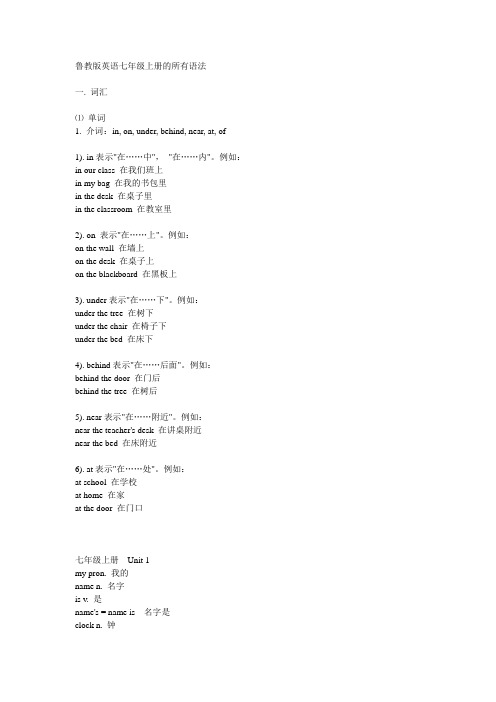
鲁教版英语七年级上册的所有语法一. 词汇⑴单词1. 介词:in, on, under, behind, near, at, of1). in表示"在……中","在……内"。
例如:in our class 在我们班上in my bag 在我的书包里in the desk 在桌子里in the classroom 在教室里2). on 表示"在……上"。
例如:on the wall 在墙上on the desk 在桌子上on the blackboard 在黑板上3). under表示"在……下"。
例如:under the tree 在树下under the chair 在椅子下under the bed 在床下4). behind表示"在……后面"。
例如:behind the door 在门后behind the tree 在树后5). near表示"在……附近"。
例如:near the teacher's desk 在讲桌附近near the bed 在床附近6). at表示"在……处"。
例如:at school 在学校at home 在家at the door 在门口七年级上册Unit 1my pron. 我的name n. 名字is v. 是name's = name is 名字是clock n. 钟I pron. 我的am v. 是I'm = I am 我是nice adj. 好的;令人愉快的to part. 用于与动词原形一起构成动词不定式meet v. 遇见;相逢you pron. 你;你们what pron. & adj. 什么what's = what is 是什么your pron. 你的;你们的hello interj. (表示问候)喂hi interj. (表示问候)嗨his pron. 他的and conj. 和;又;而且her pron. 她的question n. 问题;难题;询问;疑问answer n. 回答;答复;答案look v. 看;望;看起来first adj. 第一的first name 名字last adj. 最后的;上一个的last name 姓氏boy n. 男孩girl n. 女孩zero num. 零one num. 一two num. 二three num. 三four num. 四five num. 五six num. 六seven num. 七eight num. 八nine num. 九telephone n. 电话number n. 数;数字telephone number 电话号码phone n. 电话phone number 电话号码it pron. 它it's = it is 它是card n. 卡;卡片ID card 身份证family n. 家;家庭family name 姓氏七年级上册Unit 2this pron. & adj. 这;这个pencil n. 铅笔pen n. 钢笔book n. 书eraser n. 橡皮;铅笔擦;黑板擦ruler n. 尺;直尺case n. 箱;盒;橱pencil case 铅笔盒;文具盒backpack n. 双肩背包pencil sharpener 卷笔刀;铅笔刀dictionary n. 字典;词典that pron. & adj. 那;那个yes adv. (表示肯定)是no adv. (表示否定)不;不是not adv. (构成否定形式)不是isn't = is not 不是excuse v. 原谅;宽恕excuse me 请原谅(客套语,用于与陌生人搭话、打断别人说话等场合)thank v. 感谢OK interj. 好;不错in prep. 用(表示方法,媒介,工具等)English n. 英语;英文a art. 一个(只,把,台……)how adv. (指程度)多么;何等;怎样do v. & aux. 做;干;构成否定句、疑问句的助动词spell v. 拼写baseball n. 棒球watch n. 手表computer n. 电脑;电子计算机game n. 游戏computer game 电子游戏key n. 钥匙notebook n. 笔记本ring n. 环;戒指call v. 打电话at prep. 在……(里面或附近);在……(点、刻);以in prep. 在……里面the art. 表示特指的人、物、事或群体lost v. 遗失found v. 找回lost and found 失物招领please interj. (祈使句中用作请求的客套话)请school n. 学校a set of 一套;一副of prep. (属于)……r七年级上册Unit 3sister n. 姐;妹mother n. 妈妈;母亲father n. 爸爸;父亲parent n. 父亲或母亲brother n. 兄;弟grandmother n. 祖母;外祖母grandfather n. 祖父;外祖父friend n. 朋友grandparent n. 祖父(母);外祖父(母)those pron. & adj. 那些are v. 是that's 那是these pron. & adj. 这些she pron. 她he pron. 他he's = he is 他是aunt n. 姨母;姑母;伯母;婶母;舅母son n. 儿子cousin n. 堂(表)兄弟;堂(表)姐妹daughter n. 女儿uncle n. 叔;伯;舅;姨夫;姑父picture n. 照片;图片dear adj. 亲爱的(冠于信函中的称谓,以示礼貌)for prep. 为了(表示目的或原因)thanks for 为……而感谢photo n. 照片;相片here adv. 这里;在这里七年级上册Unit 4where adv. 在哪里(疑问副词)where's = where is 在哪儿table n. 桌子bed n. 床dresser n. 梳妆台bookcase n. 书橱;书柜sofa n. 沙发chair n. 椅子drawer n. 抽屉plant n. 植物under prep. 在……下they pron. 他们they're = they are 他们是on prep. 在……上don't = do not 不know v. 知道;了解bag n. 书包;提包;袋子math n. 数学alarm clock 闹钟CD abbr. 光盘video n. 录像;视频tape n. 录音带video tape 录像带hat n. 帽子take v. 拿走;带到thing n. 东西;物to prep. 朝;向;至;达mom n. 妈妈(非正式用语)can modal v. 能;可以;会bring v. 拿来;取来;带来some adj. & pron. 一些;若干need v. 需要floor n. 地板;地面room n. 房间TV abbr. 电视;电视机desk n. 书桌;课桌七年级上册Unit 5have v. 有soccer n. 英式足球ball n. 球soccer ball 英式足球tennis n. 网球racket n. 球拍(网球、羽毛球的)tennis racket 网球拍ping-pong n. 乒乓球volleyball n. 排球basketball n. 篮球bat n. 球拍(乒乓球等的)does v. & aux. 做;干;构成否定句、疑问句的助动词(动词do的第三人称单数形式doesn't = does not 不let v. 允许;让us pron. 我们(we的宾格)let's = let us 让我们;让咱们play v. 玩;打(球)well interj. 喔;噢;唔;这个sound v. 听起来good adj. 良好的;令人满意的sport n. 运动we pron. 我们many adj. 大量的club n. 社团;俱乐部more pron. 更多的;更大的class n. 班级;(一节)课interesting adj. 有趣的;令人感兴趣的boring adj. 无聊的;令人生厌的fun adj. 令人愉快的difficult adj. 困难的relaxing adj. 轻松的watch v. 观看;注视watch TV 看电视has v. (have的第三人单数形式)有great adj. 美妙的;大的collection n. 收藏品;收集物but conj. 但是play sports 参加体育运动或比赛only adv. 只;仅仅them pron. (they的宾格)他(她,它)们every adj. 每一;每个day n. 天;日间;白天;一日七年级上册Unit 6like v. 喜欢banana n. 香蕉hamburger n. 汉堡包tomato n. 西红柿broccoli n. 花椰菜French fries 炸马铃薯条;薯条orange n. 橙子ice n. 冰cream n. 奶油;乳脂ice cream 冰淇淋salad n. 沙拉strawberry n. 草莓pear n. 梨have v. 吃;饮oh interj. 啊;噢;呀(表示惊讶等)countable noun 可数名词uncountable noun 不可数名词food n. 食物egg n. 蛋;鸡蛋apple n. 苹果carrot n. 胡萝卜chicken n. 鸡;鸡肉breakfast n. 早餐lunch n. 午餐dinner n. 晚餐;正餐fruit n. 水果vegetable n. 蔬菜;植物runner n. 奔跑者eat v. 吃well adv. 好;对;满意地run v. 跑;奔跑star n. 星星;明星lot adv. 许多;很多lots of 大量;许多healthy adj. 健康的;强健的dessert n. (饭后的)甜食list n. 清单七年级上册复习Unit 1 to 6furniture n. 家具(总称)people n. 人;人民an art. (元音前)一个(只,把,台……)blank n. 空白conversation n. 交谈;谈话other pron. & adj. 另外的人(物);其他的also adv. 也;亦;并且七年级上册Unit 7how much (价钱)多少pants n. (pl.)裤子sock n. 短袜shirt n. 男衬衣;衬衫T-shirt n. T恤衫shorts n. (pl.)短裤sweater n. 毛衣shoe n. 鞋skirt n. 裙子sale n. 出售;廉价销售dollar n. 元(美国、加拿大等国的货币单位,符号为$)color n. 色;颜色black adj. & n. 黑色(的)white adj. & n. 白色(的)red adj. & n. 红色(的)green adj. & n. 绿色(的)blue adj. & n. 蓝色(的)yellow adj. & n. 黄色(的)big adj. 广大的;重大的small adj. 小的;小号的short adj. 短的;矮的long adj. 长的clerk n. (银行、办公室、商店等的)职员;办事员help v. 帮助;援助want v. 需要;想要Here you are. 给你。
鲁教版九年级英语全一册知识点总结

鲁教版初三英语全一册(义务教育教科书)Unit 1 When was it invented?Unit 2 Teenagers should be allowed to choose their own clothes.Unit 3 It must belong to Carla.Unit 4 I like music that I can dance to.Unit 5 You\\'re supposed to shake hands.Unit 6 Sad movies make me cry.Unit 7 Life is full of the unexpected.Unit 8 We\\'re going to save the earth!Unit 9 It\\'s important to have good habits.Unit 10 I remember meeting all of you in Grade 6. Unit 11 What\\'s the highest mountain in the world?Unit 12 Could you please tell me where the restooms are?英语语法单词表不规则动词表知识点总结Unit 1语法:虚拟语气 If+一般过去时句子,主语+would +动词原形。
知识点:1 . hundred 百, thousand 千 ,million 百万, billion 十亿前面有确切数字时不加s不加of 如 two hundred前面没有确切数字时加s加of 如 hundreds of2 .worry about …= be worried about…为…担心3. else 修饰疑问词、不定代词、不定副词要后置。
如:what else ,something else4. enjoy oneself 玩的高兴 enjoy doing 喜欢做某事5. help sb. (to)do sth. Help sb. with sth. 帮助某人做某事6. too … to … ,not …enough todo. so…that…7. be afraid to do sth. be afraid ofdoing/n. 害怕做某事8. not …at all =not …in the slightest 一点也不9. plenty of =a lot of 许多…10.would rather do than do , would dorather than do ,prefer to do rather than do.宁愿做…而不愿做…11. be friendly to…对某人友好12. be famous for… 因为…而著名befamous as… 作为…而出名13 .something bad 形容词修饰不定代词要后置14. stop doing 停止做某事stop to do 停下来去做某事15 alone 客观上一个人“独自” live alone 独居 lonely 主观上感到孤独 feel lonely 感到孤独unit21. must “一定”;can’t“ 一定不” “不可能”may/might /could“可能”2.belong to + 名词/代词= be sb’s“属于”3. because + 句子 ;because of +短语4.在附近 in theneighborhood neighbor 指人5. used to do 过去常常做某事get/beused to doing 习惯于做某事beused to do 被用来做某事beused for doing被用来做某事6. happen to sb. 某人发生什么事。
鲁教版五四制英语各单元话题及语法要点
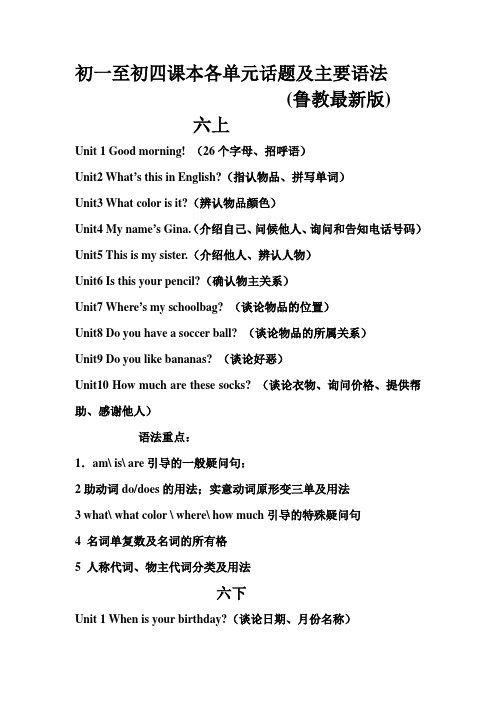
初一至初四课本各单元话题及主要语法(鲁教最新版)六上Unit 1 Good morning! (26个字母、招呼语)Unit2 What’s this in English?(指认物品、拼写单词)Unit3 What color is it?(辨认物品颜色)Unit4 My name’s Gina.(介绍自己、问候他人、询问和告知电话号码)Unit5 This is my sister.(介绍他人、辨认人物)Unit6 Is this your pencil?(确认物主关系)Unit7 Where’s my schoolbag? (谈论物品的位置)Unit8 Do you have a soccer ball? (谈论物品的所属关系)Unit9 Do you like bananas? (谈论好恶)Unit10 How much are these socks? (谈论衣物、询问价格、提供帮助、感谢他人)语法重点:1.am\ is\ are引导的一般疑问句:2助动词do/does的用法;实意动词原形变三单及用法3 what\ what color \ where\ how much引导的特殊疑问句4 名词单复数及名词的所有格5 人称代词、物主代词分类及用法六下Unit 1 When is your birthday?(谈论日期、月份名称)Unit 2 My favorite subject is science. (谈论课程的喜好并给出理由)Unit 3 Can you play the guitar? (谈论乐器、运动等方面的能力)Unit 4 What time do you go to school? (日常活动的时间)Unit 5 How do you get to school? (谈论出行方式)Unit 6 Don’t eat in class. (谈论家规与校规)Unit 7 Why do you like pandas? (谈论对动物的好恶并给出理由)Unit 8 I’m watching TV. (谈论正在进行的事情)Unit 9 It’s raining! (谈论天气)Unit10 Is there a post office near here? (关于方位的问与答、某处存在某物)语法重点:1 现在进行时、基数词与序数词2 祈使句、情态动词can的用法3 there be 句型4 when/ why/ how/ what time引导的特殊疑问句七上Unit1 What does he look like? (从体型、身高、发型等方面描写人物外貌)Unit 2 I’d like some noodles. (餐馆点餐用语及食物名称)Unit3How was your school trip? (谈论过去的某次旅行)Unit 4 What did you do last weekend? (谈论上周的周末活动)Unit5 Where did you go on vacation? (谈论过去的某次度假)。
鲁教版英语九年级各单元重难点总结详细

鲁教版英语九年级各单元重难点总结详细1 / 26初四英语Unit 1 What would you do ?重点短语 1. What if2. pretend to do sth.3. be late for4. a few 与 a little ,few 与 little5. still6. hundred, thousand , million, billion7. what if + 从句8 . add sth. to sth. 9. 系动词与形容词连用 10. too +形/副+to do sth. 11. help with sth 12. in public 13. energetic, energy 14. ask sb. to do 与ask sb. not to do sth. 15. start doing =start to do.16. borrow sth. from sb. 17.wait for sb 18. introduce sb. to sb. 19. invite sb. to do 20. have dinner/ supper have breakfast/ lunch/dinner 21 . plenty of + 可数名词/不可数名词 22.give sth. to sb.= give sb. sth.23. get along with sb. 24. would rather do sth. than do sth. 25. whole 26. in fact 27. let sb. down 28. come up with sth.与 catch up with sb. 29. have experience doing30. come out 31. by accident 32. hurry to do33. more than 34. offer sb. sth.重点句型1. What would you do if you won a million dollars? 假如你赢了一百万美元,你将用它做什么? 动词win 和beat 都可以表示“赢,胜”,其区别是:前者后接比赛、奖品、名声、2. If I were you, I ’d wear a shirt and tie. 如果我是你,我就穿衬衫戴领带。
鲁教版初中教材语法知识点列表
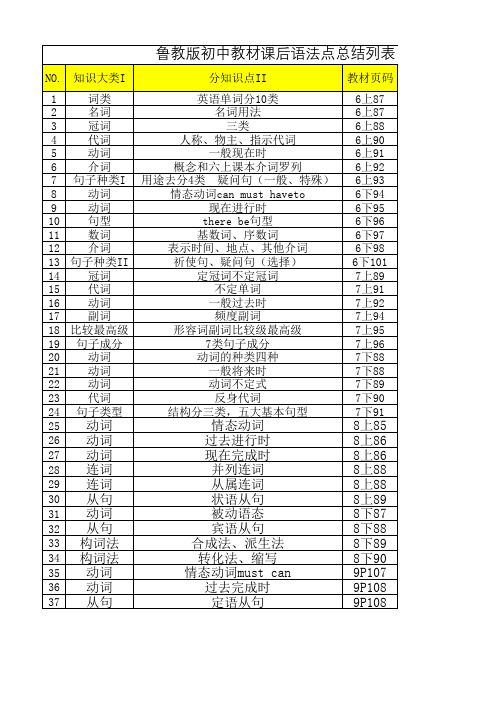
NO. 知识大类I
分知识点II
教材页码
1
词类
英语单词分10类
2
名词
名词用法
3
冠词
三类
4
代词
人称、物主、指示代词
5
动词
一般现在时
6
介词
概念和六上课本介词罗列
7 句子种类I 用途去分4类 疑问句(一般、特殊)
8
动词
情态动词can must haveto
9
动词
现在进行时
10 句型
22 动词
动词不定式
23 代词
反身代词
24 句子类型
结构分三类,五大基本句型
25 动词
情态动词
26 动词
过去进行时
27 动词
现在完成时28 连词来自并列连词29 连词
从属连词
30 从句
状语从句
31 动词
被动语态
32 从句
宾语从句
33 构词法
合成法、派生法
34 构词法
转化法、缩写
35 动词
情态动词must can
36 动词
过去完成时
37 从句
定语从句
6上87 6上87 6上88 6上90 6上91 6上92 6上93 6下94 6下95 6下96 6下97 6下98 6下101 7上89 7上91 7上92 7上94 7上95 7上96 7下88 7下88 7下89 7下90 7下91
8上85 8上86 8上86 8上88 8上88 8上89 8下87 8下88 8下89 8下90 9P107 9P108 9P108
there be句型
11 数词
基数词、序数词
初中英语鲁教版时态和名词知识点汇总

时态一、一般现在时1.用法:(1)表示经常性或习惯性的动作或状态。
常见的时间标志词包含often,sometimes,usually,always,on Sundays,every day/week/month/year 等。
如:I drink milk every day.(2)表示普遍真理、客观存在或科学事实。
如:The moon moves around the earth. 月球绕着地球转。
(3)表示主语具备的性格和能力。
如:John likes hamburgers.(4)“主将从现”原则。
主句是一般将来时,从句是由when,after,before,not...until,as soon as 等引导的时间状语从句或由if,unless,as long as,once引导的条件状语从句时,从句用一般现在时。
如:I will go to the park if it doesn’t rain tomorrow. 如果明天不下雨我将会去公园。
2.基本结构:3.动词第三人称单数形式变化规则:规律例词一般在词尾加-s play→plays leave→leavesswim→swims以字母s, x, ch, sh, o结尾的词加-es pass →passes fix→fixesteach→teacheswish→wishes do→does以“辅音字母+y”结尾的动词,变y为i, 加es,study→studies carry→carries fly→flies二、现在进行时1.用法:(1) 现在进行时表示现在或现在这段时间正在进行的动作。
常用时间标志词:now, right now, Look, Listen, Be quiet , / It’s 8 o’clock. / Where is Linda? / at the moment / all the time / these days.They are talking now. 他们正在交流。
初中英语各年级语法复习要点(鲁教版)
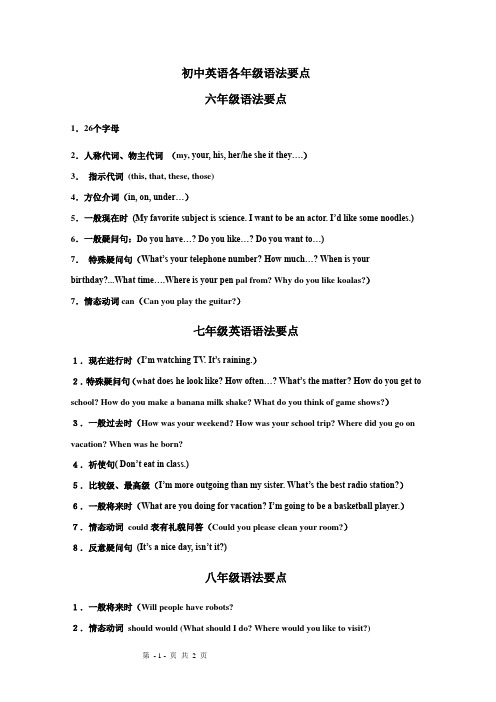
初中英语各年级语法要点六年级语法要点1.26个字母2.人称代词、物主代词(my, your, his, her/he she it they….)3.指示代词(this, that, these, those)4.方位介词(in, on, under…)5.一般现在时(My favorite subject is science. I want to be an actor. I’d like some noodles.) 6.一般疑问句:Do you have…? Do you like…? Do you want to…)7.特殊疑问句(What’s your telephone number? How much…? When is your birthday?...What time….Where is your pen pal from? Why do you like koalas?)7.情态动词can(Can you play the guitar?)七年级英语语法要点1.现在进行时(I’m watching TV. It’s raining.)2.特殊疑问句(wh at does he look like? How often…? What’s the matter? How do you get to school? How do you make a banana milk shake? What do you think of game shows?)3.一般过去时(How was your weekend? How was your school trip? Where did you go on vacation? When was he born?4.祈使句( Don’t eat in class.)5.比较级、最高级(I’m more outgoing than my sister. What’s the best radio station?)6.一般将来时(What are you doing for vacation? I’m going to be a basketball player.)7.情态动词could表有礼貌问答(Could you please clean your room?)8.反意疑问句(It’s a nice day, isn’t it?)八年级语法要点1.一般将来时(Will people have robots?2.情态动词should would (What should I do? Where would you like to visit?)3.过去进行时(What were you doing when the UFO arrived?)4.间接引语(He said I was hard working.)5.条件状语从句(If you go to the party, you will have a great time!)6.现在完成进行时(How long have you been collecting shells?)7.动名词(Would you mind doing… How about doing… V+by doing)8.现在完成时(Have you ever been to an amusement park? Have you packed yet?)9.Used to do 结构(I used to be afraid of the dark.)10.含有情态动词的被动语态(should be allowed Teenagers should be allowed to choose their own clothes)11.定语从句(I like music that I can dance to.九年级语法要点1.虚拟语气(What would you do? If I were you, I’d take a long walk…)2.情态动词表推测(must, might, could, can’t)3.被动语态的疑问句和陈述句(When was it invented?)4.宾语从句(Could you please tell me where the restrooms are?)5.过去完成时(By the time I got outside, the bus had already left.)6.动词不定式 ( be supposed to doYou are supposed to shake hands.make sb. doLoud music makes me tense.It’s important to doIt’s important to have a healthy lifestyle. )7.数词/大数字(The world highest mountain is 8844 metres high)。
九年级英语全册各单元话题及语法要点鲁教版

各单元话题及主要语法六上Unit 1 Good morning! (26个字母、招呼语)Unit2 What’s this in English?(指认物品、拼写单词)Unit3 What color is it?(辨认物品颜色)Unit4 My name’s Gina.(介绍自己、问候他人、询问和告知电话号码)Unit5 This is my sister.(介绍他人、辨认人物)Unit6 Is this your pencil?(确认物主关系)Unit7 Where’s my schoolbag? (谈论物品的位置)Unit8 Do you have a soccer ball? (谈论物品的所属关系)Unit9 Do you like bananas? (谈论好恶)Unit10 How much are these socks? (谈论衣物、询问价格、提供帮助、感谢他人)语法重点:1.am\ is\ are引导的一般疑问句:2助动词do/does的用法;实意动词原形变三单及用法3 what\ what color \ where\ how much引导的特殊疑问句4 名词单复数及名词的所有格5 人称代词、物主代词分类及用法六下Unit 1 When is your birthday?(谈论日期、月份名称)Unit 2 My favorite subject is science. (谈论课程的喜好并给出理由)Unit 3 Can you play the guitar? (谈论乐器、运动等方面的能力)Unit 4 What time do you go to school? (日常活动的时间)Unit 5 How do you get to school? (谈论出行方式)Unit 6 Don’t eat in class. (谈论家规与校规)Unit 7 Why do you like pandas? (谈论对动物的好恶并给出理由)Unit 8 I’m watching TV. (谈论正在进行的事情)Unit 9 It’s raining! (谈论天气)Unit10 Is there a post office near here? (关于方位的问与答、某处存在某物)语法重点:1 现在进行时、基数词与序数词2 祈使句、情态动词can的用法3 there be 句型4 when/ why/ how/ what time引导的特殊疑问句七上Unit1 What does he look like? (从体型、身高、发型等方面描写人物外貌)Unit 2 I’d like some noodles. (餐馆点餐用语及食物名称)Unit3How was your school trip? (谈论过去的某次旅行)Unit 4 What did you do last weekend? (谈论上周的周末活动)Unit5 Where did you go on vacation? (谈论过去的某次度假)Unit 6 How often do you exercise? (谈论人物做某事的频率)Unit 7 I’m more outgoing than my sister. (谈论相比较之下的人物性格特点)Unit8 What’s the best movie theater? (谈论喜好)语法重点:1would like的用法及区分名词的可数、不可数2 一般过去时、不规则动词的过去式变化3形容词、副词的比较级与最高级4 表频率的副词七下Unit1 Do you want to watch a game show? (谈论各类电视节目的喜好)Unit2 I’m going to study computer science. (谈论对学习、工作计划和打算)Unit3 Will people have robots? (将来要发生的事情)Unit4 How do you make a banana milk shake? (描述做某事的过程)Unit5 Can you come to my party? (发出、接受和拒绝邀请及义务、职责)Unit6 If you go to the party, you’ll have a great time! (谈论做某事的条件及结果)Unit7 What’s the matter? (谈论疾病、健康问题并给出建议)Unit8 I’ll help to clean up the city parks. (参与社区活动,提供帮助)语法重点:1一般将来时及两种表达2 表先后副词3 if引导的条件状语从句:主将从现4 提建议各种表达八上Unit1 Could you please clean your room? (礼貌地提出请求和征寻许可)Unit2 Why don’t you talk to your parents? (谈论生活、学习中遇到的难题并给出解决建议)Unit3 What were you doing when the rainstorm came? (讲诉过去某一时刻正在发生的事情)Unit 4 An old man tried to move the mountains. (学习用各种时态讲故事)Unit5 What’s the highest mountain in the world? (学习“之最”的表达)Unit 6 Have you read Treasure Island yet? (谈论过去已经发生过的事情,强调对现存的影响)Unit7 Have you ever been to a museum? (谈论过去游览过的地方)Unit8 I’ve had this bike for three years. (谈论某种状态持续了多久)语法重点:1现在完成时(第6、7、8单元)2 形容词、副词的比较级与最高级及其注意事项(第5单元)3过去进行时:当一个动作发生时另一个动作正在进行(第3单元)4 提建议的方法(第2单元)5 Could的用法:委婉地表达请求和征寻许可(第1单元)八下Unit1 When was he born?(谈论我们所崇拜的名人)Unit 2 It’s a nice day, isn’t it?(谈论与陌生人的闲聊)Unit3 Where would you like to visit?(谈论假期里想去游览的地方)Unit4 How can we become good learners?(谈论有效的学习方法)Unit5 I think that mooncakes are delicious!(谈论各种节日并给出个人看法)Unit6 Could you please tell me where the restrooms are?(礼貌地询问处所方位信息并指路)Unit7 I used to be afraid of the dark.(谈论今夕对比)Unit8 What are the shirts made of?(谈论产品的原材料与产地)语法重点:1 反意疑问句(第2 单元)2做某事的方式:by doing sth (第 4 单元)3 陈述句、一般疑问句作宾语从句,感叹句(第 5 单元)4 特殊疑问句作宾语从句,用could 表示委婉语气(第 6 单元)5 used to do sth: 过去常常做某事(第7 单元)6 被动语态(第 8 单元)九年级全册Unit1 When was it invented? (谈论物品发明的历史)Unit2 Teenagers should be allowed to choose their own clothes. (谈论被允许、赞同或不赞同做某事)Unit3 It must belong to Carla. (学习做出判断的表达)Unit4 I like music that I can dance to. (表达对各类物品的喜好)Unit5 You’re supposed to shake hands. (谈论各国及应该做的事情)Unit6 Sad movies make me cry. (谈论事件对人物的影响)Unit7 Life is full of the unexpected. (讲诉发生在过去的两件事的先后关系)Unit8 We’re trying to save the earth. (污染与环境保护问题)Unit9 It’s important to have good habits. (对比习惯与行为)Unit10 I remember meeting all of you in Grade 6. (回味过去展望未来)语法重点:1一般过去时的被动语态2含情态动词的被动语态3 使用恰当的情态动词表示判断4定语从句5 be supposed to do sth:被期望做某事6 宾语补足语7 过去完成时8 疑问句作宾语从句。
鲁教版初一英语语法用法复习大全

1. 形容词的用法:形容词用以修饰名词,表示人或事物的特征。
在句中可以作定语、表语,用于限定被修饰语的特征,如长短、大小、重量、颜色、高矮、胖瘦、新旧等,。
,“限定词”包括:冠词、物主代词、指示代词、或数词,它位于各类形容词前。
它本身分为三位,即:前、中、后。
前位限定词有all、half、both、分数和倍数;中位限定词有冠词、指示代词、物主代词等;后位限定词有基数词和序数词,但序数词位于基数词前。
如:both my hands、all half his income等。
“描绘”性形容词如:beautiful、bad、cold、great等。
“大长高”表示大小、长短、高低等一些词。
表示“形状”的词如:round square等。
“国籍”指一个国家或地区的词。
“材料”的词如:wooden, woolen, stone,silk等。
“作用类别”的词如:medical, college,writing desk,police car等。
The little girl is very pretty. 这个小女孩很好看。
--I want that one. 我想要那个。
--Which one? 哪一个?--The new blue one. 那个蓝色新的。
Can I have a look at the big nice one? 我能看一看那个大的漂亮的吗?2、人称代词:是用来表示人的代词,有单数和负数之分,有主格和宾格之分。
人称代词的主格在句中作主语;人称代词的宾格在句中作宾语,是作动词或介词的宾语。
主格:I, we, you, he, she, it, they在句子中作主语宾格:me, us, you, him, her, it, them在句子中作宾语He and I are in the same class. 我和他在同一个班级。
Can you see them in the street? 你能看见他们在街上吗?3、可数名词和不可数名词:英语中名词分为可数名词和不可数名词。
鲁教版英语七年级上知识点总结

1.现在进行时态:结构:主语+be动词+动词ing+其他2. 现在分词的构成规则如下:1)一般动词后直接加-ing.如: reading, watching, seeing2)以不发音的e结尾的词去掉e再加-ing. 如: make—making write—writing3)以重读、闭音、单辅音字母结尾的词,双写这个辅音字母,再加-ing. 如: get-getting swim-swimming put-putting run-running3.用法:1)表示现在(说话瞬间)正在进行或发生的动作。
(不能指状态。
)2)表示现阶段正在进行,而此刻不一定在进行的动作。
(以these days为代表)3)表即将发生的动作。
这类词有:come, go, leave, arrive等,常与表将来的时间状语连用。
4.常见标志:1) 句中有:now, at the moment,these days, look,listen等如:He is doing his homework now.Look, what is the girl drawing5. 现在进行时的一般疑问句及回答:一般疑问句把be动词提前;回答用Yes,主语+be或No, 主语+be+not。
如:Are you making the bed Yes, I am.Is the girl drawing a picture No, she isn’t.6. 现在进行时的否定句:在be动词后加not。
如:They are cleaning the classroom.→They aren’t cleaning the classroom.7. 对现在进行时的谓语动词提问,常用“what…doing”。
如:He is reading a book.→What is he doin g .wait for 等候talk to 与…… 谈话talk about 谈论go to the movies 去看电影write a letter 写一封信reading a book 看书here is a photo of my family .这是我家的一张照片in the next photo 在下张照片上play basketball 打篮球watch TV 看电视play computer games 玩电脑游戏take photos 照相play the guitar 弹吉他have a good time=have fun =have a good time 玩的开心重点句子1.What are you/they doing你们/他们在做什么2.What is he/she doing他/她在做什么3.I'm watching TV. 我正在看电视。
鲁教版初一重点语法运用

一、指示代词this和that的用法(1)this或者that 作主语时,连系动词be要用单数形式is,同时后面名词用单数形式。
例如:This is a pen.That is a tree.(2)向别人介绍某人时,要用“This is .......”,不用“that is.....”例如:This is Alan.(3)在回答this或that做主语的句子时,要用it来代替this或者that。
例如:—Is this a hamburger?—Yes,it is .—Wh at’s that?—It’s a pig.二、不定冠词a/an及定冠词的用法(1)a常用在以辅音音素开头的单词前,an用于以元音音素开头的单词前面。
(2)a book “一本书”表示数量一(3)A boy wants to see you. 泛指某人某物,不具体说明(4)That is a car,not a jeep. 指一类事物定冠词the 特指某些人或者某些事用法如下:(1)特指某些人或者某些事物,或对话中双方都知道的人或事。
That is the car.(2)上文中提到的,下文中再次出现I see a box,The box is on the desk.(3)用于世界上独一无二的事物前或者唯一范围呢唯一的事物on the earthon the wall(4)用于某些普通名词构成的专有名词前the Great Wall(5)西洋乐器的名词前面,或固定搭配前play the pianopaly the guitar三、人称代词及物主代词1、人称代词分为主格和宾格形式,并且有单复数形式主格宾格人称 数格 单数 复数 单数 复数第一人称 I we me us 第二人称 you you you you 第三人称 he theyhim themshe heritit2.人称代词的主格通常在句子中做主语,若单数人称并列做主语时,英语中的顺序常为:第二人称-第三人称-第一人称,即:you and he,he and I ,you and I,you,he and I.3.人称代词与be 动词的关系:连系动词be 一般用于现在时态当中,主要有am/is/are我(I )用am ,你(you)用are ,is 连着她(she)他(he)它(it),复数形式全用are 例如:I am a boy. He is a student. she is a beautiful girl. It is a little dog. They are my best friends. 4.形容词性的物主代词: 形容词性物主代词具有形容词的性质,在句中做定语,修饰名词,不可单独使用,当有形容词修饰时,物主代词置于形容词之前。
- 1、下载文档前请自行甄别文档内容的完整性,平台不提供额外的编辑、内容补充、找答案等附加服务。
- 2、"仅部分预览"的文档,不可在线预览部分如存在完整性等问题,可反馈申请退款(可完整预览的文档不适用该条件!)。
- 3、如文档侵犯您的权益,请联系客服反馈,我们会尽快为您处理(人工客服工作时间:9:00-18:30)。
初中英语各年级语法复习要点(鲁教版)
初中英语各年级语法要点
六年级语法要点
1.26个字母
2.人称代词、物主代词(my, your, his, her/he she it they….)3.指示代词(this, that, these, those)
4.方位介词(in, on, under…)
5.一般现在时(My favorite subject is science. I want to be an actor. I’d like some noodles.) 6.一般疑问句:Do you have…? Do you like…? Do you want to…)
7.特殊疑问句(What’s your telephone number? How much…? When is your birthday?...What time….Where is your pen pal from? Why do you like koalas?)
7.情态动词can(Can you play the guitar?)
七年级英语语法要点
1.现在进行时(I’m watching TV. It’s raining.)
2.特殊疑问句(wh at does he look like? How often…? What’s the matter? How do you get to school? How do you make a banana milk shake? What do you think of game shows?)3.一般过去时(How was your weekend? How was your school trip? Where did you go on vacation? When was he born?
4.祈使句( Don’t eat in class.)
5.比较级、最高级(I’m more outgoing than my sister. What’s the best radio station?)6.一般将来时(What are you doing for vacation? I’m going to be a basketba ll player.)7.情态动词could表有礼貌问答(Could you please clean your room?)8.反意疑问句(It’s a nice day, isn’t it?)
八年级语法要点
1.一般将来时(Will people have robots?
2.情态动词should would (What should I do? Where would you like to visit?)
3.过去进行时(What were you doing when the UFO arrived?) 4.间接引语(He said I was hard working.)
5.条件状语从句(If you go to the party, you will have a great time!)
6.现在完成进行时(How long have you been collecting shells?)
7.动名词(Would you mind doing… How about doing… V+by doing)
8.现在完成时(Have you ever been to an amusement park? Have you packed yet?)9.Used to do 结构(I used to be afraid of the dark.)
10.含有情态动词的被动语态(should be allowed Teenagers should be allowed to choose their own clothes)
11.定语从句(I like music that I can dance to.
九年级语法要点
1.虚拟语气(What would you do? If I wer e you, I’d take a long walk…)
2.情态动词表推测(must, might, could, can’t)
3.被动语态的疑问句和陈述句(When was it invented?)
4.宾语从句(Could you please tell me where the restrooms are?)
5.过去完成时(By the time I got outside, the bus had already left.)
6.动词不定式 ( be supposed to do
You are supposed to shake hands.
make sb. do
Loud music makes me tense.
It’s important to do
It’s important to have a healthy lifestyle. )
7.数词/大数字(The world highest mountain is 8844 metres high)。
